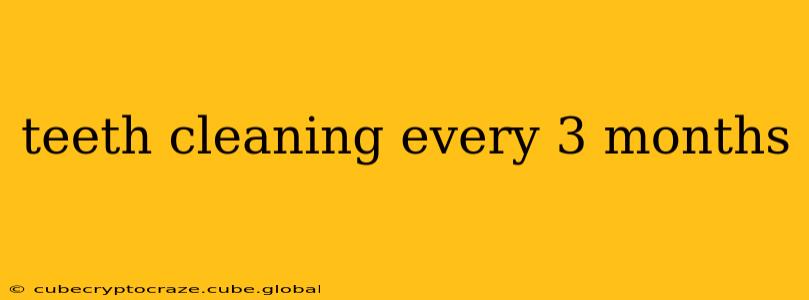Maintaining optimal oral hygiene is crucial for overall health. While brushing and flossing daily are essential, regular professional cleanings play a vital role in preventing dental problems. Many people wonder: should I get my teeth cleaned every 3 months? The answer, as with many things in dentistry, isn't a simple yes or no. Let's delve into the frequency of professional cleanings and determine what's best for your individual needs.
How Often Should I Get My Teeth Cleaned?
The recommended frequency of professional teeth cleanings varies depending on individual oral health. While some dental professionals may suggest every three months, the general consensus leans toward every six months for individuals with good oral hygiene habits and no underlying dental issues. However, individuals with specific conditions or risk factors may require more frequent cleanings.
What Factors Determine Cleaning Frequency?
Several factors influence how often you should visit your dentist for a professional cleaning:
- Gum health: Individuals with gingivitis or periodontitis (gum disease) often need more frequent cleanings, potentially every three months or even more often, to control inflammation and prevent further damage.
- Plaque and tartar buildup: If you tend to accumulate significant plaque and tartar despite diligent brushing and flossing, more frequent cleanings might be necessary.
- Medical history: Certain medical conditions can increase the risk of gum disease or other oral health problems, necessitating more frequent professional cleanings.
- Smoking: Smoking significantly increases the risk of gum disease and other oral health issues, leading to a recommendation for more frequent cleanings.
- Dental work: Individuals with extensive dental work, such as bridges, crowns, or implants, may require more regular checkups and cleanings to ensure the longevity and health of these restorations.
Is Getting My Teeth Cleaned Every 3 Months Necessary?
While getting your teeth cleaned every three months might be beneficial for some individuals, it's not a universal recommendation. For many people, every six months is sufficient, provided they maintain a rigorous home oral hygiene routine. Overly frequent cleanings aren't necessarily harmful, but they're also not always necessary and can be an unnecessary expense.
What Happens During a Professional Teeth Cleaning?
A professional cleaning typically involves:
- Examination: Your dentist will assess your overall oral health, checking for cavities, gum disease, and other potential problems.
- Removal of plaque and tartar: Using specialized tools, your hygienist will meticulously remove plaque and tartar buildup from your teeth and gum line.
- Polishing: After removing plaque and tartar, your teeth will be polished to remove surface stains and leave your teeth feeling smooth and clean.
- Fluoride treatment (often): A fluoride treatment can help strengthen your enamel and protect against cavities.
Are there any disadvantages to getting my teeth cleaned every 3 months?
While generally safe, frequent cleanings can lead to potential disadvantages:
- Cost: More frequent cleanings naturally translate to higher dental expenses.
- Sensitivity: Some individuals might experience temporary tooth sensitivity after cleanings. While this is usually temporary, more frequent cleanings could exacerbate this issue.
- Erosion: While rare, overly aggressive cleaning could potentially contribute to minor enamel erosion over time.
What if I have sensitive teeth?
If you have sensitive teeth, discuss this with your dentist. They may suggest adjustments to the cleaning process or recommend alternative techniques to minimize discomfort. They can also explore the possibility of desensitizing toothpaste or treatments.
Can I clean my teeth at home as effectively as a professional cleaning?
No. While brushing and flossing diligently are crucial for maintaining good oral hygiene, they cannot replicate the thoroughness and precision of a professional cleaning. Professional cleanings remove tartar, which cannot be removed by brushing and flossing alone.
How can I improve my oral hygiene at home?
- Brush twice a day: Use a soft-bristled toothbrush and fluoride toothpaste.
- Floss daily: Flossing removes plaque and food particles from between your teeth, where your toothbrush can't reach.
- Use mouthwash: Mouthwash can help kill bacteria and freshen your breath.
- Eat a healthy diet: Limit sugary and acidic foods and drinks.
- Quit smoking: Smoking significantly harms oral health.
Ultimately, the best way to determine the appropriate frequency of professional teeth cleanings is to consult with your dentist. They can assess your individual needs and risk factors to recommend a personalized cleaning schedule that optimizes your oral health. Remember, proactive dental care is essential for preventing serious problems and maintaining a healthy, confident smile.
